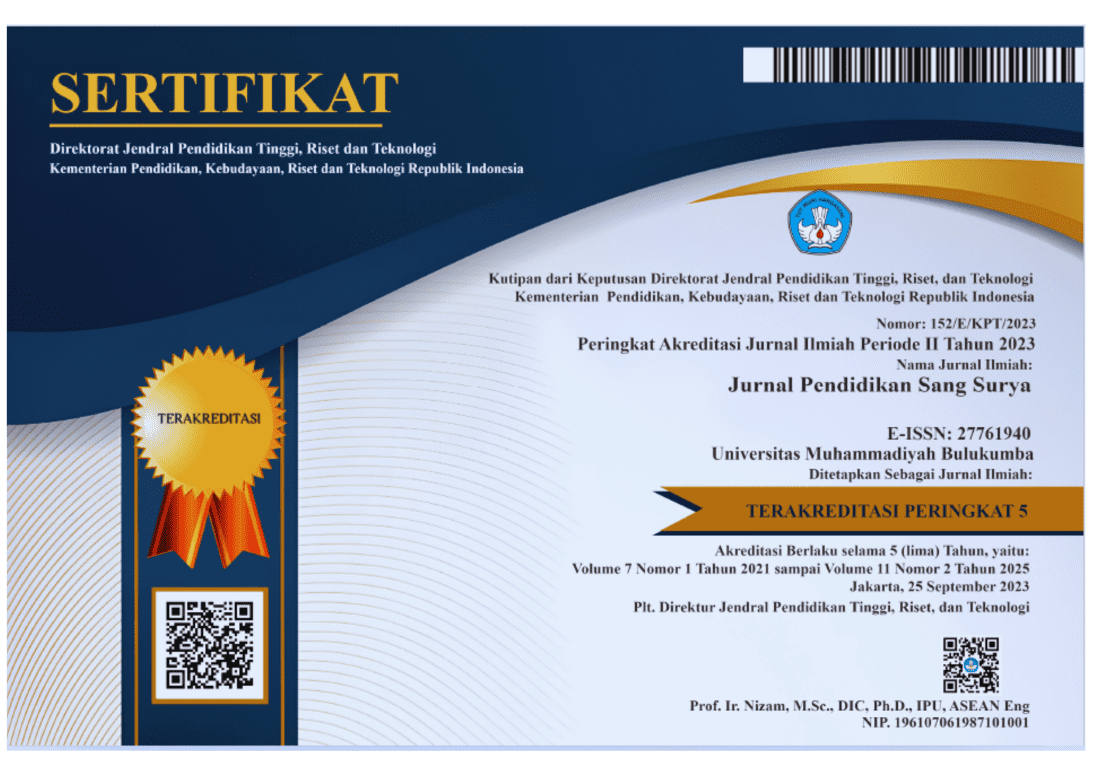MATHEMATICAL PROFICIENCY: AN ANALYSIS OF PROSPECTIVE TEACHERS' ABILITY TO SOLVE MATHEMATICAL PROBLEMS
DOI:
https://doi.org/10.56959/jpss.v11i1.449Keywords:
mathematical proficiency, prospective teacher students, mathematical problemsAbstract
Mathematical proficiency is a determinant of students' success in mathematics learning. This research aims to describe the mathematical skills of prospective teacher students, so that they can reflect and take follow-up actions to improve their mathematical skills as preparation for teaching and educating students in schools. The type of research used is descriptive research with a qualitative approach.. The research subjects are second-year prospective teacher students, totaling 35 people. This research measures 4 strands of mathematical proficiency: (1) conceptual understanding, (2) procedural fluency, (3) strategic competence, and (4) adaptive reasoning. The research results indicate that students' mathematical proficiency is still relatively low, especially in conceptual understanding, procedural fluency, and strategic components. Meanwhile, the indicator of adaptive reasoning is categorized as moderate.
Downloads
References
Altarawneh, A. F., & Marei, S. T. (2021). Mathematical proficiency and preservice classroom teachers’ instructional performance. International Journal of Education and Practice, 9(2). https://doi.org/10.18488/journal.61.2021.92.354.364
Ashari, N. W., & Salwah, S. (2024). Kecakapan Matematis: Kompetensi Strategis Siswa dalam Menyelesaikan Masalah Himpunan. Kognitif: Jurnal Riset HOTS Pendidikan Matematika, 4(2). https://doi.org/10.51574/kognitif.v4i2.1929
Awofala, A. O., Lawal, R. F., Arigbabu, A. A., & Fatade, A. O. (2022). Mathematics productive disposition as a correlate of senior secondary school students’ achievement in mathematics in Nigeria. International Journal of Mathematical Education in Science and Technology, 53(6). https://doi.org/10.1080/0020739X.2020.1815881
Barham, A. I. (2020). Exploring in-service mathematics teachers’ perceived professional development needs related to the strands of mathematical proficiency (SMP). Eurasia Journal of Mathematics, Science and Technology Education, 16(10). https://doi.org/10.29333/EJMSTE/8399
Creswell, J. W., & Creswell, J. D. (2018). Research Design: Qualitative, Quantitative, and Mixed Methods Approaches (5th ed.). SAGE Publications Asia-Pacific Pte. Ltd.
Elvi, M., & Siregar, N. A. R. (2023). Identifikasi kesalahan siswa menyelesaikan soal matematika garis dan sudut. PYTHAGORAS: JURNAL PROGRAM STUDI PENDIDIKAN MATEMATIKA, 12(2). https://doi.org/10.33373/pythagoras.v12i2.5571
Firdaus, H. P. E. (2019). Kelancaran Prosedural Matematis Mahasiswa Dalam Menyelesaikan Masalah Matematika. Konferensi Nasional Penelitian Matematika Dan Pembelajarannya (KNPMP) IV.
Groves, S. (2012). Developing Mathematical Proficiency. Journal of Science and Mathematics Education in Southeast Asia, 35(2).
Harahap, E. R., & Surya, E. (2017). KEMAMPUAN PEMECAHAN MASALAH MATEMATIS SISWA KELAS VII DALAM MENYELESAIKAN PERSAMAAN LINEAR SATU VARIABEL. Edumatica, 07(1).
Herlina, S., & Juandi, D. (2022). Systematics Literature Review: Pengembangan Mathematical Proficiency dalam Pembelajaran Matematika. Jurnal Cendekia : Jurnal Pendidikan Matematika, 6(2). https://doi.org/10.31004/cendekia.v6i2.1417
Kilpatrick, J., Swafford, J., & Findell, B. (2001). Adding It Up: Helping Children Learn Mathematics. In Academic Emergency Medicine (Vol. 17, Issue 12). National Academy Press.
O’Connor, R. B. (2024). Methodologies to reveal young Australian Indigenous students’ mathematical proficiency. Mathematics Education Research Journal, 36(2). https://doi.org/10.1007/s13394-023-00447-z
Rittle-Johnson, B., & Schneider, M. (2015). Developing Conceptual and Procedural Knowledge of Mathematics. In Oxford handbook of numerical cognition. Oxford University Press.
Sudiarta, I. G. P., & Widana, I. W. (2019). Increasing mathematical proficiency and students character: Lesson from the implementation of blended learning in junior high school in Bali. Journal of Physics: Conference Series, 1317(1). https://doi.org/10.1088/1742-6596/1317/1/012118
Turmuzi, M., & Kurniawan, E. (2021). Kemampuan Mengajar Mahasiswa Calon Guru Matematika Ditinjau dari Technological Pedagogical and Content Knowledge (TPACK) pada Mata Kuliah Micro Teaching. Jurnal Cendekia : Jurnal Pendidikan Matematika, 5(3). https://doi.org/10.31004/cendekia.v5i3.881
Yulian, V. N., & Wahyudin. (2018). Analysing categories of mathematical proficiency based on Kilpatrick opinion in junior high school. Journal of Physics: Conference Series, 1132(1). https://doi.org/10.1088/1742-6596/1132/1/012052
Zandy, S. S., & Negara, H. R. P. (2024). Mathematical proficiency siswa pada materi persamaan garis lurus ditinjau dari resiliensi matematis. Journal of Didactic Mathematics, 5(1), 70–80. https://doi.org/10.34007/jdm.v5i1.2197
Downloads
Published
How to Cite
Issue
Section
License
Copyright (c) 2025 Jurnal Pendidikan Sang Surya

This work is licensed under a Creative Commons Attribution-ShareAlike 4.0 International License.
Jurnal Pendidikan Sang Surya dilisensikan di bawah Lisensi Internasional Creative Commons Attribution-NonCommercial-ShareAlike 4.0
Artikel di Jurnal Pendidikan Sang Surya adalah artikel Akses Terbuka yang diterbitkan di bawah Lisensi Creative Commons CC BY-NC-SA Lisensi ini mengizinkan penggunaan, distribusi, dan reproduksi dalam media apa pun untuk tujuan non-komersial saja, asalkan karya dan sumber aslinya dikutip dengan benar. Setiap turunan dari aslinya harus didistribusikan di bawah lisensi yang sama dengan aslinya.



